Trey'von Knowles's Blog, page 9
July 27, 2025
Royal Blood
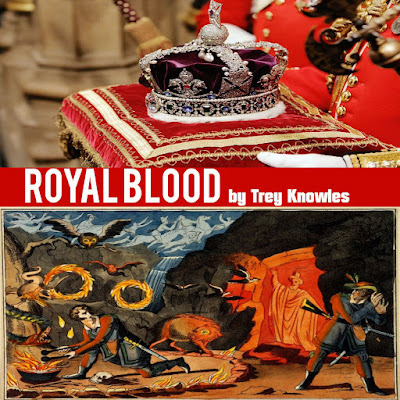
“Royal Blood” is a sharp and humorous stand-up comedy by Trey Knowles, where he takes aim at the British royal family. In his bold routine, Knowles argues that the monarchy is a counterfeit kingdom that lacks the true spirit of God, yet profits from religious traditions and the Bible. He humorously exposes King Charles as a symbolic figure with no real spiritual authority, drawing a stark contrast between him and biblical prophets like John the Baptist. Knowles doesn't hold back, portraying the royal family as more aligned with sorcery than divine leadership.
https://crosssides.blogspot.com/July 26, 2025
What Kind of Love You Have For Me
In "What Kind of Love You Have For Me," Trey Knowles challenges his audience with a powerful question: Can you live peacefully among others? When most of the audience indicates they cannot, he responds by saying this reveals a deeper spiritual issue. Knowles explains that rejecting others—especially based on race—is incompatible with truly following Jesus. He emphasizes that if someone harbors hatred, particularly toward Black people, they are also rejecting Jesus himself. According to Knowles, such attitudes show that a person is not prepared to live in the kingdom of heaven.
https://crosssides.blogspot.com/July 25, 2025
Cancel the Culture | Truth & Knowledge
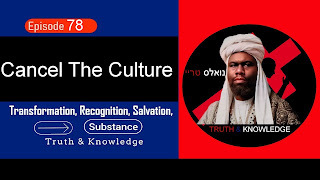
Truth & Knowledge: Episode 78 – "Cancel the Culture"
In this episode, Trey Knowles discusses the importance of rejecting the culture of the devil and choosing to live for God. He emphasizes that those who continue in sin do not belong to God, as God is righteous and calls His people to be holy. Trey encourages believers to turn away from worldly influences and live in alignment with God's will. The episode highlights how the world, the flesh, and the devil are often seen as the primary forces that oppose God and lead people away from a true relationship with Him.https://crosssides.blogspot.com/
July 23, 2025
Pyramids in America Kentucky Mountains
What is America hiding?
!function(r,u,m,b,l,e){r._Rumble=b,r[b]||(r[b]=function(){(r[b]._=r[b]._||[]).push(arguments);if(r[b]._.length==1){l=u.createElement(m),e=u.getElementsByTagName(m)[0],l.async=1,l.src="https://rumble.com/embedJS/u2kzfpi&qu..., document, "script", "Rumble");Rumble("play", {"video":"v6uevra","div":"rumble_v6uevra"});https://crosssides.blogspot.com/
July 20, 2025
Seeking Whom He May Devour

In Seeking Whom He May Devour, Trey Knowles portrays Great Britain, France, and America as metaphorical devils—predatory forces like a roaring lion—actively seeking to dominate and destroy nations and individuals for the sake of power and control. Knowles urges his audience to remain sober-minded, vigilant, and alert to the deceptive and destructive tactics used by these global powers. He emphasizes how these nations oppress others through methods such as temptation, manipulation, and deceit, constantly seeking opportunities to cause harm.
!function(r,u,m,b,l,e){r._Rumble=b,r[b]||(r[b]=function(){(r[b]._=r[b]._||[]).push(arguments);if(r[b]._.length==1){l=u.createElement(m),e=u.getElementsByTagName(m)[0],l.async=1,l.src="https://rumble.com/embedJS/u2kzfpi&qu..., document, "script", "Rumble");Rumble("play", {"video":"v6u9vc6","div":"rumble_v6u9vc6"});https://crosssides.blogspot.com/Who is Your Enemy America?
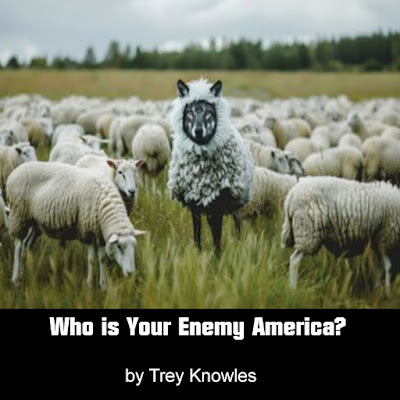
In Who Is Your Enemy America?, Trey Knowles challenges the narrative that nations like Islam, China, or Russia are America's enemies is laughable. He argues that these claims are deceptive and distract from the real issue. According to Knowles, these nations are not responsible for America's moral and spiritual decline—America is. He asserts that the U.S. spreads its own corrupt values and influences other nations to follow its sinful ways. Citing 1 John 2:15, which warns against loving the world and its desires, Knowles concludes that America’s true enemy is not external, but internal—its own values, actions, and departure from God.
https://crosssides.blogspot.com/Power and Control: How the Devil Did It
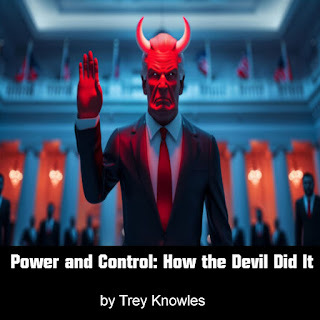
In Power and Control: How the Devil Did It, Trey Knowles challenges the idea of the American Dream, declaring it a deceptive system rooted not in God's will, but in the devil's influence. He argues that the pursuit of the American Dream promotes self-centeredness, materialism, and pride—values that are in direct opposition to the Kingdom of God. Knowles emphasizes that the devil’s method of control is to make people endorse and sustain a system where they must pay simply to live a decent life, which contrasts with God’s original intent for humanity. According to Knowles, Jesus came to offer abundant life through dependence on God—not through chasing worldly success shaped by the devil’s values.
Repercussions of Power and Control
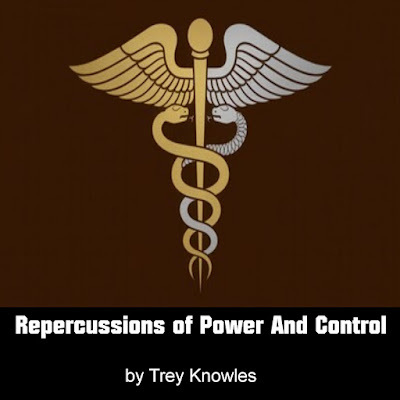
In Repercussions of Power and Control, Trey Knowles draws a parallel between indigenous nations and the biblical story of Adam and Eve. He argues that just as the devil deceived Adam and Eve into turning away from their dependence on God, the same deception has been used for centuries to lead indigenous peoples away from their original state of spiritual and cultural alignment with God. Knowles emphasizes that the devil's tools for gaining power and control—such as slavery, colonization, and cultural manipulation—have replaced authentic ways of life with counterfeit systems rooted in deception. The work exposes the ongoing consequences of these tactics in today's world, revealing how societies continue to suffer under the lingering effects of these spiritual and political strategies.
https://crosssides.blogspot.com/July 18, 2025
Stop Eating From the Belly of the Beast | Truth & Knowledge

Truth & Knowledge - Episode 77: "Stop Eating From the Belly of the Beast"
In this episode of Truth & Knowledge, Trey Knowles explores the idea that our desires and the influences we allow into our hearts and minds must reflect the character and love of God. He explains that both God and the enemy offer us a "table"—a way of life, a set of values, and choices. The question is: which table are you choosing? If what you seek or accept does not align with God's truth and love, then you're feeding from the "belly of the beast"—a place of deception and destruction, not divine purpose.https://crosssides.blogspot.com/
July 17, 2025
Druze

The Druze (/druːz/ DROOZ; Arabic: دَرْزِيّ, darzī or دُرْزِيّ durzī, pl. دُرُوز, durūz), who call themselves al-Muwaḥḥidūn (lit. 'the monotheists' or 'the unitarians'), are an Arab esoteric religious group from West Asia who adhere to the Druze faith, an Abrahamic, monotheistic, and syncretic religion whose main tenets assert the unity of God, reincarnation, and the eternity of the soul.
Although the Druze faith developed from Isma'ilism, Druze do not identify as Muslims. They maintain the Arabic language and culture as integral parts of their identity, with Arabic being their primary language. Most Druze religious practices are kept secret, and conversion to their religion is not permitted for outsiders. Interfaith marriages are rare and strongly discouraged. They differentiate between spiritual individuals, known as "uqqāl", who hold the faith's secrets, and secular ones, known as "juhhāl", who focus on worldly matters. Druze believe that, after completing the cycle of rebirth through successive reincarnations, the soul reunites with the Cosmic Mind.
The Epistles of Wisdom is the foundational and central text of the Druze faith. The Druze faith originated in Isma'ilism (a branch of Shia Islam), and has been influenced by a diverse range of traditions, including Christianity, Gnosticism, Neoplatonism, Zoroastrianism, Manichaeism, Pythagoreanism. This has led to the development of a distinct and secretive theology, characterized by an esoteric interpretation of scripture that emphasizes the importance of the mind and truthfulness. Druze beliefs include the concepts of theophany and reincarnation.
The Druze faith is one of the major religious groups in the Levant, with between 800,000 and a million adherents. They are primarily located in Lebanon, Syria, and Israel, with smaller communities in Jordan. They make up 5.5% of Lebanon's population, 3% of Syria's and 1.6% of Israel's. The oldest and most densely populated Druze communities exist in Mount Lebanon and in the south of Syria around Jabal al-Druze (literally the "Mountain of the Druze"). The Druze community played a critically important role in shaping the history of the Levant, where it continues to play a significant political role. As a religious minority, they have often faced persecution from various Muslim regimes, including contemporary Islamic extremism.
Several theories about the origins of the Druze have been proposed, with the Arabian hypothesis being the most widely accepted among historians, intellectuals, and religious leaders within the Druze community. This hypothesis significantly influences the Druze's self-perception, cultural identity, and both oral and written traditions. It suggests that the Druze are descended from 12 Arab tribes that migrated to Syria before and during the early Islamic period. This perspective is accepted by the entire Druze communities in Syria and Lebanon, as well as by most Druze in Israel.
The name Druze is derived from the name of Muhammad bin Ismail Nashtakin ad-Darazī (from Persian darzi, "seamster") who was an early preacher. Although the Druze consider ad-Darazī a heretic, the name has been used to identify them, possibly by their historical opponents as a way to attach their community with ad-Darazi's poor reputation.
Before becoming public, the movement was secretive and held closed meetings in what was known as Sessions of Wisdom. During this stage a dispute occurred between ad-Darazi and Hamza bin Ali mainly concerning ad-Darazi's ghuluww ("exaggeration"), which refers to the belief that God was incarnated in human beings to ad-Darazi naming himself "The Sword of the Faith", which led Hamza to write an epistle refuting the need for the sword to spread the faith and several epistles refuting the beliefs of the ghulat.
In 1016 ad-Darazi and his followers openly proclaimed their beliefs and called people to join them, causing riots in Cairo against the Unitarian movement including Hamza bin Ali and his followers. This led to the suspension of the movement for one year and the expulsion of ad-Darazi and his supporters.
Although the Druze religious books describe ad-Darazi as the "insolent one" and as the "calf" who is narrow-minded and hasty, the name "Druze" is still used for identification and for historical reasons. In 1018, ad-Darazi was assassinated for his teachings; some sources claim that he was executed by Al-Hakim bi-Amr Allah.
Some authorities see in the name "Druze" a descriptive epithet, derived from Arabic dārisah ("she who studies"). Others have speculated that the word comes from the Persian word Darazo (درز "bliss") or from Shaykh Hussayn ad-Darazī, who was one of the early converts to the faith. In the early stages of the movement, the word "Druze" is rarely mentioned by historians, and in Druze religious texts only the word Muwaḥḥidūn ("Unitarian") appears.
The only early Arab historian who mentions the Druze is the eleventh century Christian scholar Yahya of Antioch, who clearly refers to the heretical group created by ad-Darazī, rather than the followers of Hamza ibn 'Alī. As for Western sources, Benjamin of Tudela, the Jewish traveler who passed through Lebanon in or around 1165, was one of the first European writers to refer to the Druze by name.
The word Dogziyin ("Druzes") occurs in an early Hebrew edition of his travels, but it is clear that this is a scribal error. Be that as it may, he described the Druze as "mountain dwellers, monotheists, who believe in 'soul eternity' and reincarnation". He also stated that "they loved the Jews"
The number of Druze people worldwide is between 800,000 and one million, with the vast majority residing in the Levant. The primary countries with Druze populations are Syria, Lebanon, Israel and Jordan.
!function(r,u,m,b,l,e){r._Rumble=b,r[b]||(r[b]=function(){(r[b]._=r[b]._||[]).push(arguments);if(r[b]._.length==1){l=u.createElement(m),e=u.getElementsByTagName(m)[0],l.async=1,l.src="https://rumble.com/embedJS/u2kzfpi&qu..., document, "script", "Rumble");Rumble("play", {"video":"v6u542w","div":"rumble_v6u542w"});https://crosssides.blogspot.com/



